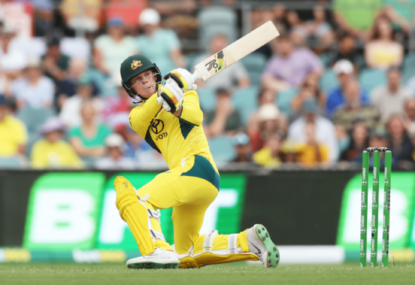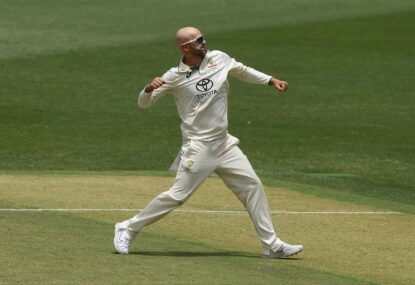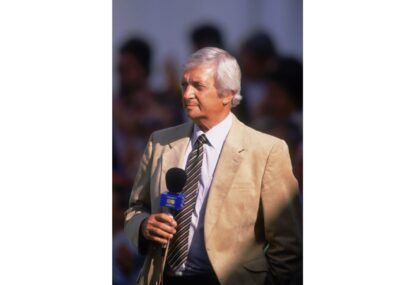Australia are the only nation to have won the ICC World Cup three times in a row, and three players – Ricky Ponting, Glenn McGrath and Adam Gilchrist – had the privilege of being part of each of the three winning sides.
Ponting of course was the captain in 2003 – when he creamed an unbeaten 140 in the final – and 2007.
McGrath took a combined total of six wickets in the three finals – most notably the catch off his own bowling to dismiss Sachin Tendulkar in the very first over in 2003.
But the most successful player in World Cup finals is Gilchrist, arguably the greatest wicketkeeper-batsman to have played the game.
In the 1999 final at Lord’s, Australia bowled out Pakistan for a paltry 132. Gilchrist pouched two catches behind the wicket – Inzamam-ul-Haq off the bowling of Paul Reiffel and Moin Khan off Shane Warne. He then ensured that this would be the shortest World Cup final ever, as he proceeded to hammer the demoralised Pakistani bowlers in typical fashion.
Opening the innings with Mark Waugh, Gilchrist began by cracking two boundaries off Wasim Akram in the third over. Shoaib Akhtar, who was in top form in the semi-final against New Zealand, bore the brunt as well as Gilchrist cut a quick, short ball over the ropes for six and followed it with another boundary the next ball in his third over. The introduction of Abdul Razzaq and Azhar Mahmood made no difference, as Gilchrist continued his boundary spree.
In the tenth over, he brought up his fifty from just 33 balls with a boundary over midwicket off Razzaq. The score galloped to 0/75 in the first 10 overs, and it looked as if only one team had turned up to play the match. Saqlain Mushtaq’s first ball brought an end to Gilchrist’s breezy knock, as the batsman miscued one to mid off.
But the damage had been done – Gilchrist’s 54 came from only 36 balls, with eight fours and a six. Victory was a formality, and Australia needed only 20.1 overs to seal a thumping eight-wicket win.
Four years later, Australia found themselves in the final again, this time against India at the Wanderers in Johannesburg. Ponting’s world-class bunch had been unbeaten throughout the tournament and were overwhelming favourites to successfully defend their title.
Buoyed by the excellent performance of his pace bowlers in the tournament thus far, Indian captain Sourav Ganguly elected to field first. But Gilchrist put paid to any hopes India had of gaining the upper hand early on.
This time, with Matthew Hayden as his opening partner, Gilchrist faced Zaheer Khan in the first over. Zaheer’s nerves got the better of him as he gave away two no-balls and six wides in what turned out to be a ten-ball over. Against Gilchrist, this was criminal. Australia got the start they wanted, and Gilchrist and Hayden gave a perfect launchpad to the innings. Both Zaheer and Javagal Srinath were tonked around the park by the left-handed duo, with Gilchrist being the more dominant batsman.
Srinath, who had given away just eight runs in his first two overs, came in for special treatment from Gilchrist. In the bowler’s third over, he hit two boundaries and followed it up with two boundaries and a six in his next over. In eight overs, the score read 66/0, with Gilchrist getting 43 runs of those in just 30 balls. He reached his fifty with a double off Ashish Nehra in the 13th over of the innings. He drove Harbhajan Singh for another four to bring up Australia’s hundred in a mere 13.4 overs.
In the same over, Gilchrist misjudged one from the off-spinner and skied it to Virender Sehwag, getting out for 57 off 48 balls with eight fours and a six. Hayden followed soon after, but the Indians were already sapped and it was to only get tougher for them as Ponting and Damien Martyn put on unbeaten 234 for the third wicket to propel Australia to 359/2 and eventually a 125-run win. Gilchrist took one catch, off Glenn McGrath, to dismiss Mohammed Kaif.
More than his batting, Gilchrist in the 2003 World Cup will be remembered for his sportsman spirit – he famously walked against Sri Lanka after being given not out, as he was aware that he had edged Aravinda de Silva’s delivery to wicketkeeper Kumar Sangakkara. He finished the tournament with 408 runs from 10 matches, the fourth highest tally.
His highest score was 99 – run out – against Sri Lanka in the Super Six round. A World Cup century still eluded him.
This was to change in the final of the 2007 World Cup. Prior to the game, his performance in the tournament was a middling one – 304 runs from 10 innings, with half-centuries against Netherlands and Bangladesh.
As in 2003, Australia had been unbeaten in the tournament, and had swept aside every team they countered. At the Kensington Oval in Bridgetown, the two-time defending champions faced Sri Lanka, their third different Asian opposition in a World Cup final.
A rain delay meant that the match was reduced to 38 overs a side. Ponting won the toss and had no hesitation to bat first. The start was sedate, as Gilchrist and Hayden – who was the tournament’s leading run scorer – took only four runs off the first two overs. In the third over, Gilchrist took off, crunching a boundary followed by a six over mid-on in successive balls from Chaminda Vaas. Two more fours followed in the next Vaas over, and it was evident that Gilchrist was going to make his last World Cup match special.
Lasith Malinga was bowling tightly at the other end – his first four overs went for just six runs – and the score after 10 overs was 0/46. Gilchrist, who was on 31 off 30 balls, launched into Dilhara Fernando in the 11th over. He began by clouting a full toss to midwicket for four, then another four off a half-volley past long-on and followed it with a huge six over long-on.
This was vintage Gilchrist, and just like 2003, he had succeeded in firmly putting the pressure on the opposition in the first 10 overs.
Hayden, who had bludgeoned bowling attacks in the tournament, was happy to play second fiddle this time. When Gilchrist reached his fifty from 43 balls with a single off Muttiah Muralitharan in the 14th over, Hayden was on 18 from 37 balls. Tillekaratne Dilshan also failed to have an effect on Gilchrist, as he was hit for two massive sixes straight over his head. As Australia reached 95/0 in 15 overs, Sri Lankan shoulders began to droop. Gilchrist was in his element, and nothing looked like stopping him.
Fernando returned for another spell looking to break the stand, but instead Gilchrist greeted him by thumping a six over long-off followed by four straight down the ground. Similar treatment awaited Fernando in his next over, and his figures read a sorry 5-0-56-0.
At the end of 20 overs, Australia were cruising at 0/137 – Gilchrist 96, Hayden 31. Malinga came back in the 21st over, and he too was not spared.
Off the third ball of the 21st over, Gilchrist brought up his first World Cup hundred off 72 balls by smashing a boundary over mid-off. But he was hungry for more as he lashed another flurry of boundaries off Vaas and Malinga in the next two overs. Malinga finally broke the partnership – which fetched 172 – by dismissing Hayden for 38. After a quiet couple of overs, Gilchrist resumed his charge, now collecting 2 sixes off Sanath Jayasuriya. With eight overs to go, the score was 1/222 and Sri Lanka were down for the count.
Fernando eventually got his man, as Gilchrist skied the third ball of the 31st over straight to Chamara Silva at midwicket. His astounding innings – 149 off 104 balls, with 13 fours and 8 sixes – created a new record for the highest score in a World Cup final, going past the 140* scored in 2003 by Ponting, who was the man at the other end. Gilchrist’s 8 sixes also equalled Ponting’s effort in that same innings. He later said that a squash ball inside his glove helped his cause.
Gilchrist chose the perfect platform to produce one of the great World Cup innings, and his assault led Australia to 4/281 from their 38 overs. Sri Lanka ultimately fell 53 runs short on the Duckworth/Lewis method as the match ended in a farce in near-darkness, much to the embarrassment of the organisers and umpires.
Gilchrist added two catches – to dismiss Upul Tharanga off Nathan Bracken and Russel Arnold off McGrath – and a stumping to dismiss Malinga off Andrew Symonds to go with his match-winning knock, and was the obvious choice for man of the match.
Three finals, 260 runs at an average of 86.66 and a strike rate of 138.29, with two fifties and a scintillating hundred, as well as six dismissals behind the wicket. Numbers that establish Adam Gilchrist’s standing as the most productive World Cup finalist. On the all-time World Cup run charts, he sits sixth with 1085 runs at 36.16, while his 52 dismissals are the most by a wicketkeeper.
Clearly, Gilchrist loved the big occasion like few others, and his cumulative achievements in the summit clashes of the World Cup will be difficult to surpass.






































































































